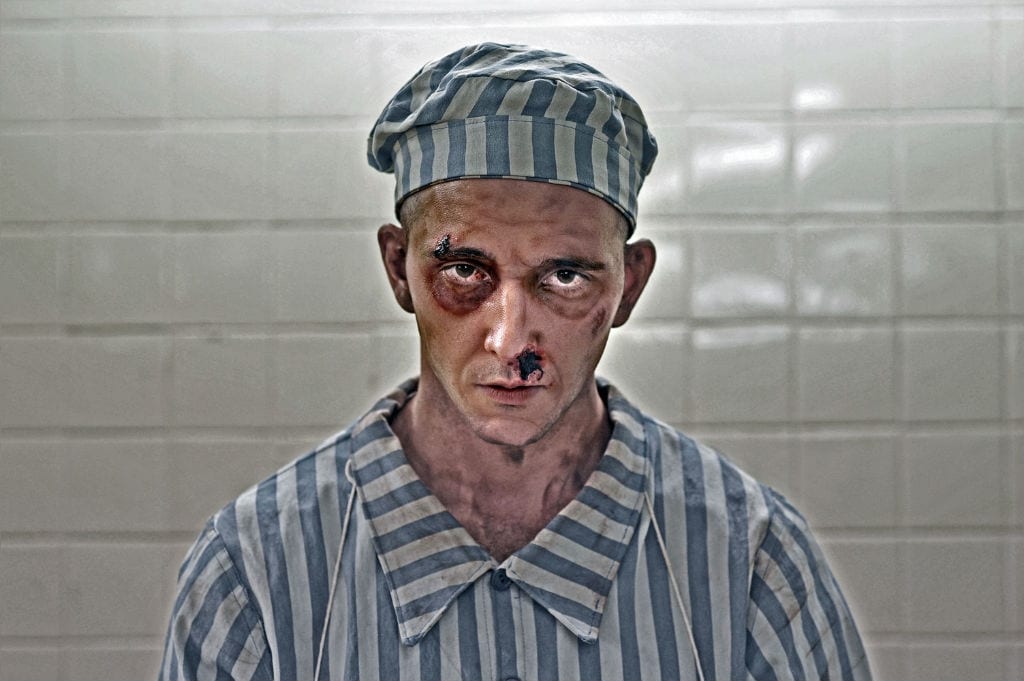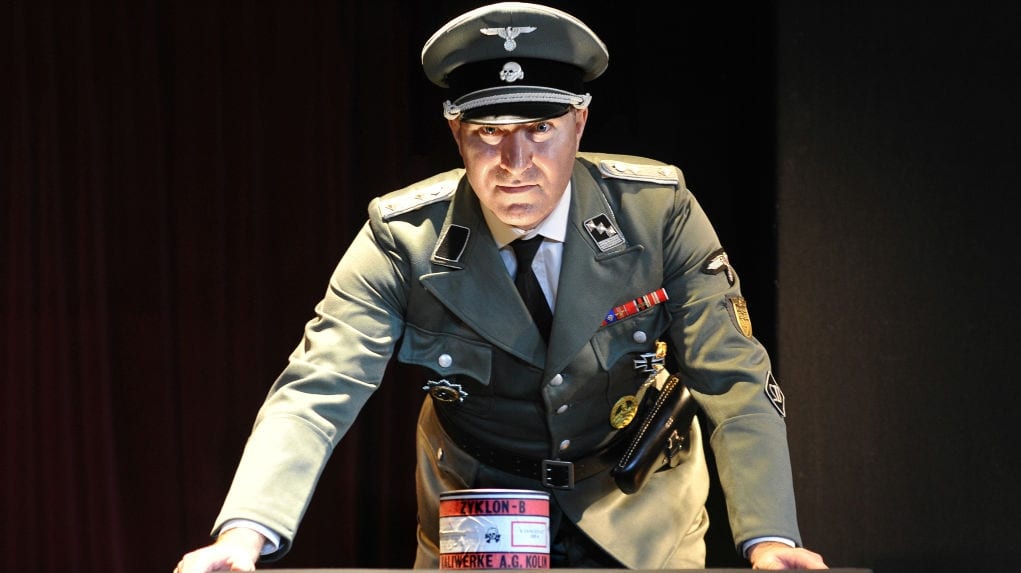This play has been on tour in the last year and now comes into Earlsfield for one performance on Holocaust Memorial Day, with all proceeds going to charity. You might expect from the billing that this piece for two actors would be a pious act of gentle commemoration. What more, after all, is there to be said dramatically about The Holocaust in 2018?
You would be wrong.
A Lesson from Auschwitz lasts only an hour, but it is a draining and uncomfortable experience of great immersive intensity, in fact thought-requiring, not just thought-provoking.
As you enter you see a concentration camp prisoner, standing with difficulty, dressed in the regulation pyjamas with Star of David, facial injuries, and a notice hanging around his neck – ‘Ich bin zurück’ – ‘I am back’. A crackly recording plays. The lights go down and a second actor enters dressed in a grey SS uniform, laden with decorations, immaculate, shiny boots squeaking as he marches precisely into position, horsewhip in hand.
What we are about to see is a re-imagining of a real-life scene in Auschwitz from 1941, when commandant Rudolf Höss explains to his SS colleagues the meaning and justification of Hitler’s ‘Final Solution’, just promulgated in Berlin. He did so while beating and humiliating a Jewish prisoner, Abraham Könisberg, who has recently attempted to escape and was now selected to be the very first victim of Zyklon B in the gas chambers.

The two actors playing the roles of victim and persecutor, Michael Shon and James Hyland, are in their contrasting ways, magnificent. The vast majority of the text is delivered by Hyland to us, his audience, in a mesmerically disturbing fashion; but Shon provides a powerful counterpoint of suffering throughout, all the more hard to stomach because it is so plausibly rendered, with every brief beseeching opportunity for passive resistance bravely taken.
Were this play simply a record of brutality it would be initially shocking and then boring and theatrically flat. But this is absolutely not what happens here. What Hyland (who also writes and directs) achieves is two things at once: a full descriptive distillation of all the elements of Nazi anti-semitism, and a sustained exercise in attempting to suborn our sympathies by dehumanising the prisoner, separating his identity from our natural sympathies. The shock also works on two levels. As Hyland shouts at, cajoles and mocks us the audience for our perceived weakness, often eye-balling individuals, we instinctively recoil not knowing whether to meet his contemptuous gaze, or look away, neither of which options offer any comfort or escape.
And worse than that we realise from our position in this experiment that we are symbolically complicit in the exercise: by consenting to listen to this unsettling rant and witness the enactment of the physical cruelties that punctuate it we open ourselves imaginatively to the possibility that we too could shed our sense of conscience and right and wrong. We grasp how it could be that the people originally sitting where we are symbolically now could and did leave the room and commit acts of almost incomprehensible barbarism with a kind of psychotic numbness.
The end result is therefore extraordinarily discomfiting on so many levels. At the end there was a stunned silence and then the audience fled, with hardly anyone staying for a drink at the bar. Not only are we disturbed by a powerfully realised drama that finds a new angles on these events where so many have trod before; but we are also taken into the dark heart of the acts involved, their impact and consequences for the victims and the motivations of the perpetrators. We ourselves are made to feel how fine the line is between participation in evil and passivity, and how turning our attention away from horror offers a further level of knowing culpability, both in the world of 1941, when so many in the world knew and did nothing, and then today, when similar choices loom into view.
This is not the ‘banality of evil’, but more properly the insinuating power of evil – therein lies the fear, the anxiety and the pity this punishing hour evokes.
There is nothing enjoyable about the evening, but this easily portable drama should be seen up and down the land, whether in schools or elsewhere, not just as the most powerful refutation there could be of Holocaust denial (still very much with us), but also as a majestic statement of the power of theatre to bring to the surface the most unpalatable moral facts. Above all this play reminds us that to live properly still requires the courage to believe in a shared humanity and willingness, if need be, to fight for it.
The prisoner’s final despairing invocation (in Hebrew) of Psalm 30 – ‘Out of the depths have I cried unto thee O Lord!’ has rarely been so richly earned and shared in a theatre.

